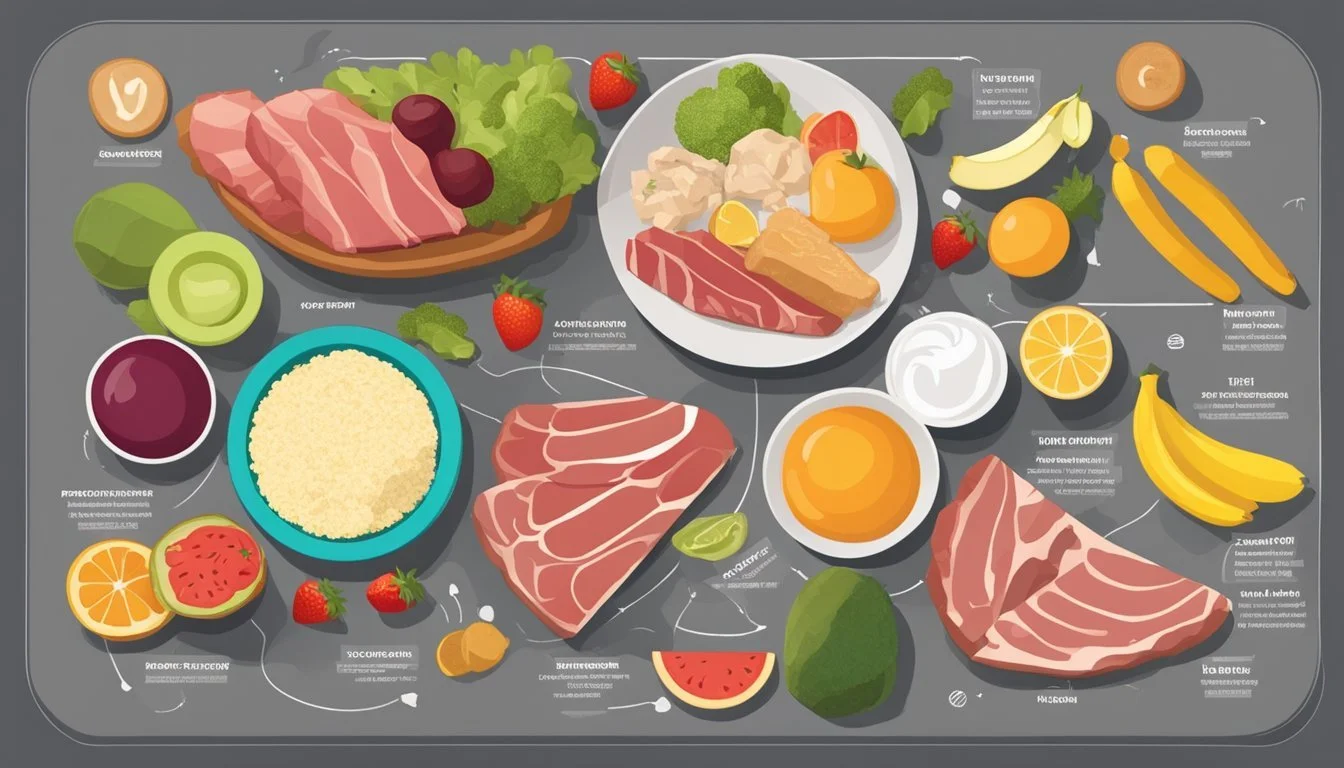Carnivore Diet vs. The Sugar Impact Diet
Exploring Hidden Sugars and Nutritional Outcomes
The Carnivore Diet and the Sugar Impact Diet represent two vastly different approaches to nutrition and health. The Carnivore Diet is an all-animal product regimen that eliminates the intake of carbohydrates, focusing solely on meat, fish, eggs, and sometimes dairy. Proponents suggest that this diet can aid in blood sugar regulation by reducing the spikes in insulin typically caused by carbohydrate consumption. The body, in the absence of carbohydrates, may improve its metabolic efficiency, potentially benefiting those with insulin resistance or diabetes.
In contrast, the Sugar Impact Diet aims to minimize the consumption of sugars, particularly hidden sugars that are often found in processed foods. The idea is to slowly retrain the palate and metabolism to function optimally with fewer sugar spikes, while not eliminating carbohydrates as a whole. This approach underscores the importance of recognizing hidden sugars in the diet, which can lead to increased insulin levels and contribute to a range of health issues if not managed properly.
Both diets are underpinned by a focus on nutrients, albeit from different sources. While the Sugar Impact Diet allows for a wider variety of foods including fruits, vegetables, and whole grains, the Carnivore Diet is restrictive but claims to provide all necessary nutrients through animal-based foods. Each diet brings to light the important relationship between dietary choices, insulin responses, and overall health, encouraging consumers to be more mindful of their eating habits.
Understanding the Basics
In contrasting the Carnivore Diet with the Sugar Impact Diet, one finds a divergence in dietary approaches, specifically in regards to macronutrient focus and the identification of hidden sugars.
What Is the Carnivore Diet?
The Carnivore Diet revolves around the consumption of animal products exclusively, emphasizing protein and fat as primary sources of calories. Individuals on this diet consume:
Meat: Beef, pork, lamb, game
Poultry: Chicken, turkey, duck
Fish and Seafood: Salmon, trout, shrimp
Animal Byproducts: Eggs, lard, bone marrow
This diet minimizes the intake of carbohydrates, fiber, and sugars, as these are naturally absent in animal flesh. The absence of these components is believed to regulate blood sugar levels by minimizing glucose spikes in the bloodstream.
Exploring the Sugar Impact Diet
Conversely, the Sugar Impact Diet focuses on the reduction of sugar intake, particularly hidden sugars, while maintaining a balanced intake of other macronutrients. This includes a conscious effort to reduce or eliminate:
Processed Foods: Often high in added sugars
High-Sugar Beverages: Sodas, fruit juices, flavored coffees
Refined Carbohydrates: White bread, pastries, which can be converted to sugars
The diet encourages the consumption of whole foods rich in fiber, complex carbohydrates, and a moderate amount of protein and fat. It educates individuals on identifying sugars cloaked in various forms on ingredient lists, which is essential for managing blood sugar and overall health.
Nutritional Comparisons
Evaluating the Carnivore Diet in contrast to the Sugar Impact Diet involves a thorough comparison of macronutrient distribution, vitamin and mineral content, and the presence of hidden sugars.
Macronutrient Distribution
Carnivore Diet:
Protein: High, primarily from meat and animal products.
Fat: High, depending on cuts of meat and preparation methods.
Carbohydrates: Minimal to none, generally no fiber, as vegetables, fruits, and grains are excluded.
Sugar Impact Diet:
Protein: Moderate to high, with an emphasis on lean sources like chicken, fish, and plant-based alternatives.
Fat: Moderate, with a focus on healthy fats from sources like avocados, nuts, and seeds.
Carbohydrates: Controlled, with the goal of reducing sugar intake by avoiding foods high in added sugars while still incorporating whole grains and fiber-rich fruits and vegetables.
Vitamins and Minerals Content
Carnivore Diet:
Rich in certain vitamins like B12 and minerals like zinc and iron, which are abundant in meat.
It may lack in vitamins and minerals typically found in plants, such as Vitamin C, Vitamin E, and magnesium.
Sugar Impact Diet:
Aimed to include a variety of vitamins and minerals from a wide range of food groups including meat, dairy, vegetables, and fruits.
Encourages the intake of nutrient-dense foods to minimize sugar while maximizing vitamin and mineral intake.
Identifying Hidden Sugars in the Diet
Carnivore Diet:
Lacks hidden sugars due to the absence of plant-based foods and processed foods, which are common sources of added sugars.
Sugar Impact Diet:
Teaches individuals to recognize and avoid hidden sugars in processed foods, dressings, sauces, and beverages.
Emphasizes reading food labels carefully to identify sugars in their many forms, such as high-fructose corn syrup, dextrose, and maltose.
Health Implications
The health implications of the Carnivore Diet and Sugar Impact Diet are significant, particularly when considering blood sugar levels, diabetes, heart health, weight management, and digestive wellness.
Impact on Blood Sugar and Diabetes
The Carnivore Diet, characterized by high protein and virtually zero carbohydrates, may lead to stable blood sugar levels due to minimal dietary sugar and starch. This could be beneficial for individuals with diabetes as it might reduce the need for insulin. However, the long-term effects on insulin sensitivity are not fully understood. Sugar-rich diets, conversely, can cause fluctuations in blood sugar and potentially increase the risk of developing type 2 diabetes if consumed excessively.
Heart Disease and Cholesterol Levels
Diets heavy in animal products, as with the Carnivore Diet, can raise questions about heart disease due to high levels of saturated fats and cholesterol intake. This calls for careful monitoring of heart health markers. On the flip side, diets high in sugars are linked to higher triglycerides, a type of fat that contributes to the risk of heart disease.
Weight Management and Obesity
A sugar-centric diet can thwart weight management efforts, leading to obesity, due to high caloric intake and less satiating meals, increasing the propensity to overeat. The Carnivore Diet may promote weight loss through increased satiety from high-protein content and the potential for a ketogenic effect, though the risk of nutrient deficiencies is a concern if there is an absence of plant-based foods.
Digestion and Gut Health
The Carnivore Diet can be challenging for gut health due to the lack of dietary fiber, which is essential for digestion. Contrariwise, diets high in sugars can negatively impact the microbiome and may contribute to gastrointestinal conditions if fiber intake is not concurrently optimized.
Diet-Specific Concerns and Benefits
This section explores the distinct advantages and potential drawbacks associated with an all-meat diet and the impact of sugar consumption on health. It also discusses the significance of fiber and fermented foods (What wine goes well with fermented foods?) in a balanced diet.
Benefits of an All-Meat Diet
The carnivore diet, with its reliance on meat, eggs, and dairy, may lead to several health benefits. Individuals often report weight loss and reduced inflammation. This diet is rich in protein and fats, which can increase satiety and preserve muscle mass. It provides high levels of certain nutrients like B12 and iron, particularly found in red meat and organ meats. Moreover, the exclusion of carbohydrate-heavy foods can lead to stable blood sugar levels.
Risks of Excessive Sugar Consumption
Conversely, diets high in sugar, particularly the Sugar Impact Diet's focus on identifying hidden sugars, are linked to health issues. Excessive sugar intake can result in an increased risk of heart disease, weight gain, and insulin resistance. Diets heavy in sugar often lead to nutrient deficiencies due to the replacement of nutrient-dense foods with high-calorie sugars that offer little nutritional value.
The Role of Fiber and Fermented Foods
While the carnivore diet excludes plant-based sources of fiber, this component remains essential for digestive health and the prevention of diseases like colorectal cancer. Fiber aids in satiety, helping maintain a healthy weight. Fermented foods, not typically included in an all-meat diet, contribute beneficial probiotics that support gut health. A balance between meat consumption and fibrous, fermented foods is crucial for a holistic dietary approach.
Lifestyle Considerations and Sustainability
When individuals decide to follow a specific diet such as the Carnivore Diet or the Sugar Impact Diet, they must consider lifestyle implications and the long-term sustainability of their choices, not just for their health, but also for the environment.
Long-term Feasibility of Diets
The Carnivore Diet involves the consumption of animal products exclusively, which may present challenges in ensuring a balanced intake of nutrients that are traditionally sourced from plants. Its long-term feasibility is a subject of debate among nutritionists and health experts due to potential nutritional deficiencies and the drastic nature of its restriction on plant-based foods.
In contrast, the Sugar Impact Diet focuses on identifying and reducing hidden sugars in one's diet. This approach is generally more sustainable in the long term as it encourages moderation rather than elimination of food groups, which can facilitate adherence and prevent deficiency-related complications.
Environmental Impact of Dietary Choices
Carnivore Diet:
Local Systems: A rise in demand for meat may benefit local farmers and economies.
Global Systems: Large-scale meat production is resource-intensive and has significant environmental costs including greenhouse gas emissions and land use concerns.
Sugar Impact Diet:
Reduced Processed Foods: By targeting hidden sugars, often prevalent in processed foods, this diet can decrease reliance on industries that are energy-intensive and contribute to environmental harm.
Each diet presents unique ecological footprints. Supporters of the Carnivore Diet argue that it can be part of regenerative farming practices, yet critics raise issues regarding the sustainability of meat-centered diets at a large scale. On the other hand, by emphasizing wholesome, unprocessed foods, the Sugar Impact Diet may support more environmentally conscious eating patterns without the heavy reliance on the meat industry.
Popular Figures and Anecdotal Evidence
This section looks into the individuals who champion the two distinct dietary approaches: the Carnivore Diet and the Sugar Impact Diet. It delves into the proponents who have influenced these movements and shares specific success stories that have emerged from adherents.
Influencers of the Carnivore Movement
One of the most vocal advocates of the Carnivore Diet is Dr. Shawn Baker, a former orthopedic surgeon. He has garnered attention through his advocacy of an all-meat diet, positing it as a solution for various health issues. Dr. Baker emphasizes what he believes to be the benefits of consuming primarily meat, and his book "The Carnivore Diet" serves as a manifesto for those interested in this way of eating.
Success Stories from the Sugar Impact Diet
The Sugar Impact Diet, created by JJ Virgin, emphasizes the reduction and management of sugar intake. Anecdotes from followers often highlight significant weight loss and improvements in energy levels. They also report a decreased craving for sweets, crediting the diet's focus on identifying hidden sugars in seemingly healthy foods.
Example of a Success Story:
Name: Emily R.
Results: Lost 25 pounds and reported sustained energy throughout the day.
Key Changes: Cut out hidden sugars by following the Sugar Impact Diet's guidelines.
These personal testimonials add a layer of relatability and credibility to the Sugar Impact Diet, corroborating Virgin's claims of the diet's efficacy in reducing sugar consumption and enhancing overall health.







